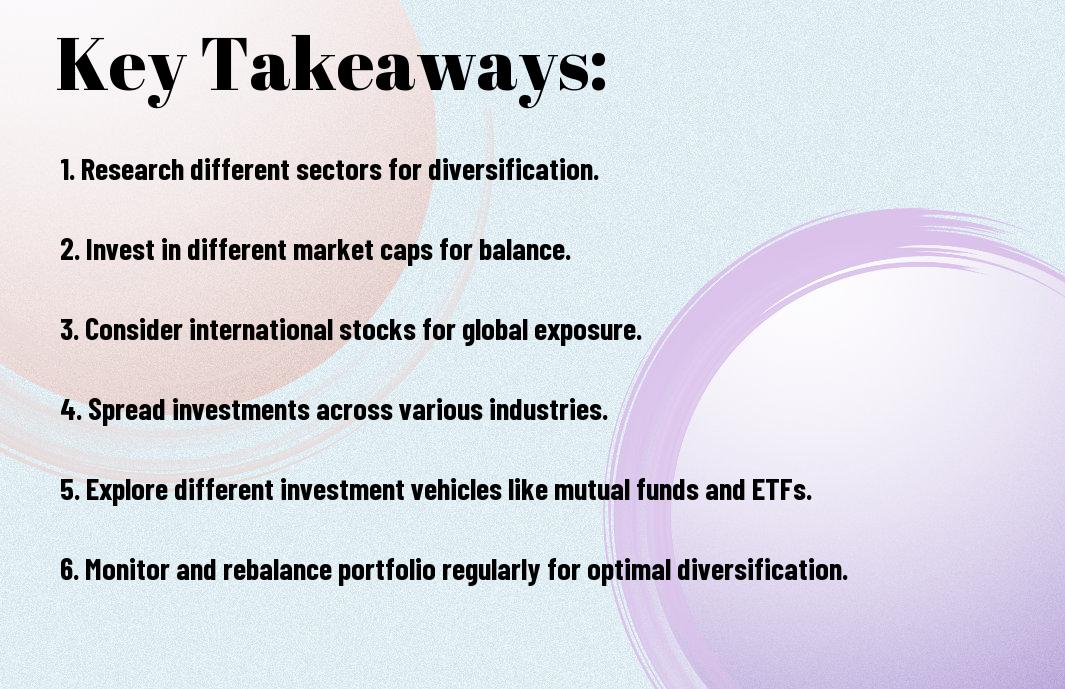When it comes to investing in the Indian stock market, it’s crucial to diversify your portfolio to minimize risk and maximize returns. By spreading your investments across different asset classes and sectors, you can protect yourself from market volatility and potential losses. In this blog post, we will discuss the importance of diversification and provide you with practical tips on how to achieve it in the Indian stock market. Whether you are a novice investor or a seasoned trader, implementing a diversified portfolio strategy can help you achieve your financial goals and secure your future. Stay tuned for expert advice and actionable insights to enhance your investment journey in the Indian stock market.
Key Takeaways:
- Understanding Market Risks: Before diversifying your portfolio, it’s crucial to understand the unique risks associated with the Indian stock market. Factors such as political instability, currency fluctuations, and regulatory changes can all impact the market.
- Exploring Different Sectors: Diversifying your portfolio in the Indian stock market involves investing in a variety of sectors, such as technology, finance, healthcare, and consumer goods. This diversity helps to reduce the impact of sector-specific market movements on your overall portfolio.
- Consider International Exposure: In addition to Indian stocks, consider including international stocks and mutual funds in your portfolio to further diversify your investments. This can help mitigate the impact of domestic market fluctuations and add an additional layer of diversification to your portfolio.


Understanding Asset Classes
Clearly, to effectively diversify your portfolio, it’s important to understand the different asset classes available in the Indian stock market. Diversifying your investments means spreading your money across different types of assets to reduce risk.
Equity Investments
When you invest in equity, you are essentially buying a share of ownership in a company. This means that you are entitled to a portion of the company’s earnings and assets. Equity investments have the potential for high returns, but they also come with a higher level of risk. It’s important to carefully research and analyze the companies you are considering investing in to make informed decisions about where to allocate your funds.
Debt Instruments
Debt instruments, such as bonds and fixed-income securities, provide a steady stream of income through regular interest payments. These investments are generally considered to be lower risk than equity investments, making them a more stable option for your portfolio. However, it’s crucial to pay attention to the credit rating of the issuer and the prevailing interest rate environment, as these factors can impact the value of your investment.
Real Estate
Investing in real estate can provide you with a source of passive income through rental yields or potential capital appreciation. It’s a tangible asset that can act as a hedge against inflation and add diversification to your portfolio. However, it’s important to consider the costs associated with property maintenance and management, as well as the illiquidity of real estate investments.
Gold and Other Commodities
Gold and other commodities, such as silver, oil, and agricultural products, can serve as a hedge against inflation and currency fluctuations. They have historically exhibited low correlation with other asset classes, making them a valuable addition to a diversified portfolio. However, it’s essential to note that commodity prices can be volatile, and investing in them carries a degree of risk.
Sectoral Diversification in India
Now, let’s delve into sectoral diversification in the Indian stock market. Sectoral diversification involves investing in a variety of sectors, such as healthcare, technology, finance, and energy, instead of concentrating all your investments in one sector. By diversifying across different sectors, you can reduce the risk associated with any one sector’s performance.
Identifying Key Sectors
When considering sectoral diversification in the Indian stock market, it’s important to identify key sectors that are expected to perform well in the long run. Some of the key sectors in India include information technology, pharmaceuticals, consumer goods, and banking. By spreading your investments across these sectors, you can mitigate the impact of any downturn in a specific sector.
Advantages of Sectoral Diversification
One of the key advantages of sectoral diversification in the Indian stock market is the ability to reduce the impact of volatility in any one sector. For example, if the banking sector experiences a downturn, your investments in other sectors such as healthcare and technology can provide a cushion. Additionally, sectoral diversification allows you to capitalize on the growth potential of different sectors, thereby improving the overall performance of your portfolio.
Investment Vehicles
After you have decided to diversify your portfolio in the Indian stock market, you should consider different investment vehicles to achieve your goals. There are several options available to you, each with its own characteristics and risk factors. It’s important to understand each one before making any investment decisions.
Direct Stock Purchases
If you are confident in your ability to pick individual stocks, you may choose to invest directly in the Indian stock market. This method allows you to have complete control over your investment decisions and potentially achieve higher returns. However, it’s important to note that direct stock purchases require a lot of research and monitoring. It also exposes you to higher risk, as the performance of your portfolio will be directly tied to the performance of the individual stocks you choose.
Mutual Funds and ETFs
Mutual funds and exchange-traded funds (ETFs) offer a more diversified approach to investing in the Indian stock market. By pooling your money with other investors, these investment vehicles allow you to invest in a wide range of stocks, bonds, or other securities. This diversification helps reduce the risk associated with individual stock picking. Mutual funds are actively managed by fund managers, while ETFs are passively managed and typically have lower fees.
Index Funds
Index funds are a type of mutual fund or ETF that aims to replicate the performance of a specific stock market index, such as the Nifty 50 or the BSE Sensex. By investing in an index fund, you are essentially investing in the entire market, which provides broad diversification and reduces the risk of underperforming the market. Index funds also tend to have lower management fees compared to actively managed funds.
Derivatives and Structured Products
Derivatives such as futures and options, as well as structured products like equity-linked debentures, offer alternative ways to gain exposure to the Indian stock market. These products can be used for hedging, speculation, or income generation, but they also come with higher risk and require a good understanding of their complexities. It’s important to carefully consider the potential risks and rewards before investing in derivatives and structured products.
Strategies for Diversification
To diversify your portfolio effectively in the Indian stock market, it is important to adopt various strategies. Diversification can help you mitigate risk and enhance long-term returns. Here are some key strategies to consider when diversifying your investment portfolio.
Asset Allocation Models
When it comes to diversifying your portfolio, implementing a strategic asset allocation model is crucial. This involves spreading your investments across different asset classes such as stocks, bonds, and cash equivalents. By doing so, you can reduce the impact of volatility in any one asset class and improve overall portfolio returns. Asset allocation models also help you align your investments with your risk tolerance and investment objectives.
Portfolio Rebalancing
Another important strategy for diversification is portfolio rebalancing. This involves periodically reviewing and adjusting the weights of different asset classes in your portfolio to bring them back to their original target allocations. By rebalancing your portfolio, you can maintain the desired level of risk and return and prevent it from becoming too heavily weighted in any one asset class. Regular portfolio rebalancing also ensures that your investments remain aligned with your long-term financial goals.
Risk Management
Diversification is a key component of effective risk management. By spreading your investments across different securities, industries, and sectors, you can reduce the impact of specific risks that may affect any one investment. This helps protect your portfolio from potential losses that may arise from adverse developments in a particular market segment or company. Implementing a sound risk management strategy through diversification can help you safeguard your investments against unforeseen events.
Diversification Across Market Caps
It is also important to diversify your portfolio across different market capitalizations, including large-cap, mid-cap, and small-cap stocks. Each of these market segments offers its own unique risk and return characteristics. By allocating your investments across different market caps, you can spread risk and capitalize on opportunities in different segments of the market. This can help you achieve a more balanced and resilient portfolio that is better positioned to weather market fluctuations.
Conclusion
Presently, you have learned various strategies to diversify your portfolio in the Indian stock market. By investing in a mix of different asset classes such as stocks, bonds, and mutual funds, you can spread out your risk and potentially increase your returns. Additionally, considering different sectors and industries within the stock market can further enhance the diversification of your portfolio. It is important to regularly review and adjust your portfolio to ensure it remains diversified and aligned with your financial goals. By implementing these strategies, you can effectively manage risk and optimize your investment returns in the Indian stock market.
FAQ
Q: What is portfolio diversification in the context of the Indian stock market?
A: Portfolio diversification in the Indian stock market refers to the practice of spreading your investment across a variety of different types of assets and securities to reduce the overall risk. This can include investing in stocks, bonds, mutual funds, and other financial instruments to create a balanced and robust portfolio.
Q: Why is it important to diversify your portfolio in the Indian stock market?
A: Diversifying your portfolio in the Indian stock market is crucial because it helps to minimize potential losses. By investing in a variety of assets, you can spread your risk and reduce the impact of a downturn in any one particular investment. Additionally, diversification can also offer the potential for higher returns, as different assets may perform well at different times.
Q: What are some strategies for diversifying a portfolio in the Indian stock market?
A: There are several strategies for diversifying your portfolio in the Indian stock market. One approach is to invest in different sectors, such as technology, healthcare, and finance, to spread your risk across different industries. Additionally, you can also diversify by investing in large-cap, mid-cap, and small-cap stocks to gain exposure to companies of varying sizes. Another strategy is to consider international investments, such as global funds or foreign stocks, to further diversify your portfolio beyond the Indian market.

